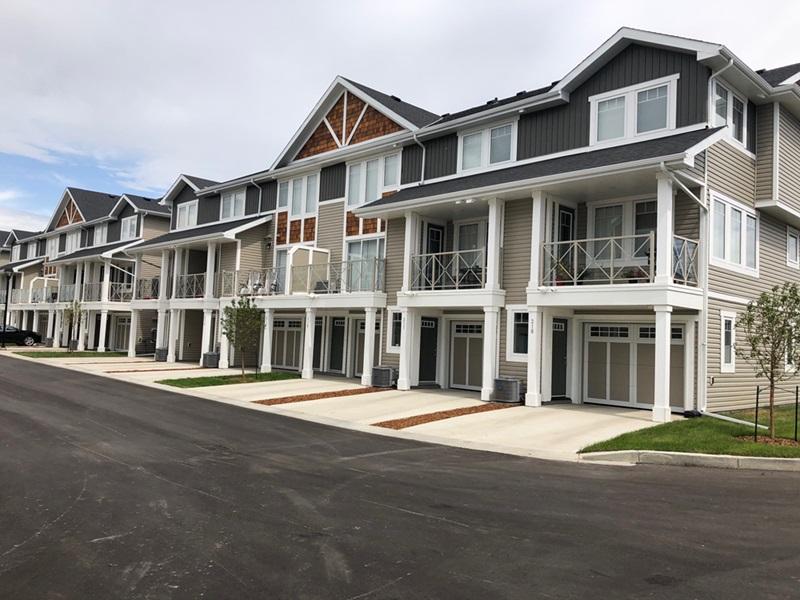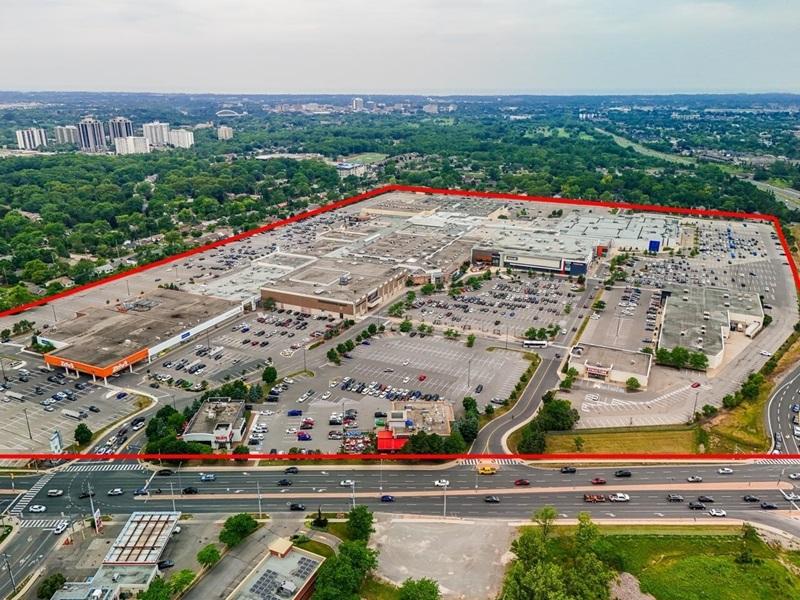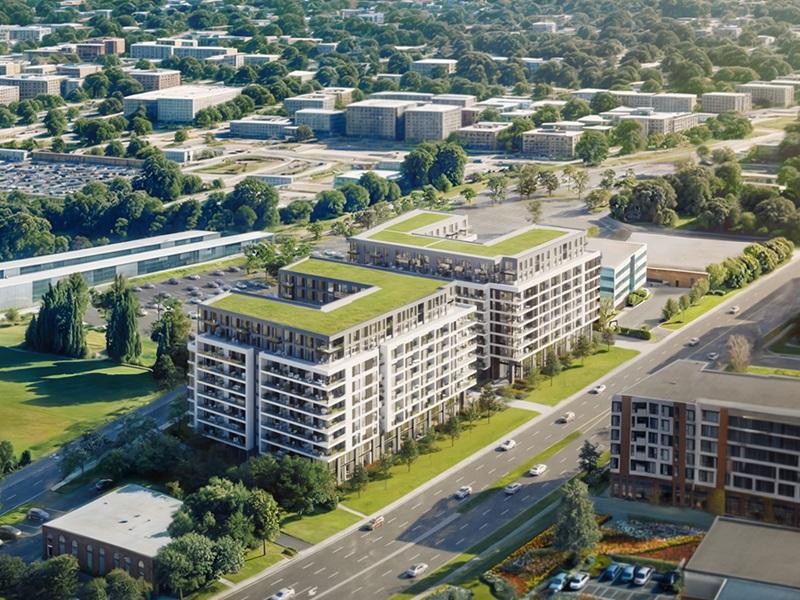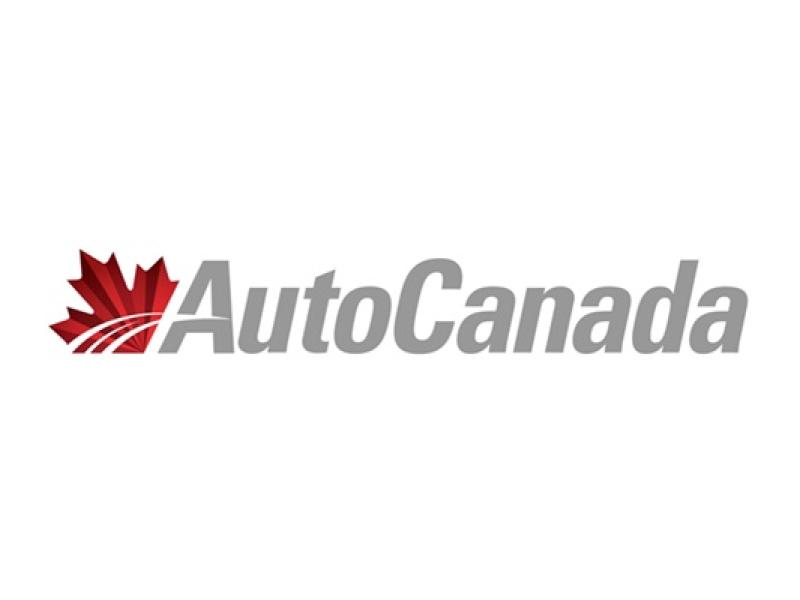
This quarter-million square foot distribution facility at 123 Great Gulf Dr., in Vaughan, northeast of Toronto, is one of Summit Industrial Income REIT’s 2020 acquisitions. (Google Maps)
Paul Dykeman says the cost to acquire industrial assets in Summit Industrial Income REIT’s target markets, combined with unceasing demand, is causing the trust to “shift gears” and ramp up its development program.
Dykeman, Summit’s president and CEO, was speaking during the REIT’s Q3 financials call with analysts and investors this week. His comments came as Summit reported what Dykeman believes will be “another record year” for the trust.
Bidding wars have become the norm for existing quality properties in Canada’s top urban markets, Dykeman said, driving up purchase prices and driving cap rates down. So, Summit (SMU-UN-T) will focus on a particular type of acquisition moving forward and is beginning to increase its building program — even if it means building on spec.
“So as a result of that, we try to do these types of sale-leasebacks, off-market or unique deals, value-add deals,” he said. “But, that is why we are going to shift gears, the only way to get those kind of quality properties in our mind is to build them ourselves.”
While reluctant to give a figure on just how Summit expects to divide its growth for the next year or so, he suggested it could get “equal contributions” from acquisitions and development.
Summit Industrial’s 2020 activity
Despite taking a break from moving forward on developments and acquisitions for several months as it assessed the impact of the COVID-19 pandemic, Summit has been very active on both fronts in 2020.
During the first nine months of the year, it acquired nine light industrial properties, all in the Greater Toronto Area market. It gained 747,000 square feet of gross leasable area for a spend of $180.3 million, at an overall blended cap rate of 4.4 per cent.
Summit’s portfolio, at the end of Q3 2020 totalled 153 properties, comprising 18.2 million square feet with a net book value of approximately $2.7 billion.
Since the end of Q3, it has actually increased that activity, with three off-market deals:
* Acquired the remaining 50 per cent interest in 11 light industrial properties in Montreal from its joint venture partner Groupe Montoni for $88 million. As part of that transaction, Montoni bought Summit’s 50 per cent interest in an office building for $5.8 million. The REIT now internally manages 100 per cent of its portfolio.
* Acquired a 244,633-square-foot class-A, single-tenant warehousing and logistics facility in the GTA for $47.3 million. That was a sale-leaseback transaction.
* Entered into agreement to acquire the remaining 50 per cent interest in two recently constructed properties in Guelph, west of Toronto, totalling 387,610 square feet from its partner Cooper Construction, for $33.9 million.
The Guelph acquisition particularly pleased Dykeman.
“We owned half of that project at cost and we bought the other half at market. The blended cap rate is an amazing 5.6 per cent and $164 per square foot,” he said. “Clearly our growth programs are accelerating and we look forward to announcing more of those in the future.”
Develop two new Guelph buildings
On the development front, Summit is launching two more buildings in Guelph, in the same area as its existing properties. It has about 775,000 square feet in the immediate pipeline and Dykeman said he expects that to all be constructed within the next year or so.
To illustrate why development has become more attractive in some of the key markets, he related the story of a recent Montreal sale.
“It’s a significant property, over $70 million in value, good-quality tenant with a 10-year lease, with one rental step after five years, and 10 institutional bidders,” he said.
“We were one of those 10 going into the second round. Guidance was 4.5 per cent but, you know, unknown because of the pandemic. Ends up this went sub-four (cap rate). This went to 3.75 per cent, probably $215 per square foot which we believe is over replacement cost.”
For Dykeman, replacement cost is the key. If he can buy under replacement, or sees upside to the property for another reason, then Summit is interested. If not, the trust wants to build.
“The golden rule which I’ve been saying for over 20 years is replacement cost. Not just where replacement cost is today, but where do we think it’s going in the future,” he noted.
Summit happy to build on spec
To that end, in Montreal Summit has a smaller property with room for growth. It plans to knock down an existing building in favour of a new build containing up to 140,000 square feet more space: “We can build far less on a price per square foot than that ($215 per square foot).”
“We have no concern that we can build on spec . . . when you are at 99.3 per cent vacancy, there’s lots of tenants including our own looking for additional space.”
In the GTA, a lack of available land in the Toronto area is pushing Summit and its competitors further into the suburbs and outlying areas.
“That’s why it has kind of pushed us a little bit east, a little bit west. So we are looking for additional land . . . in Guelph, Kitchener west of the city, or in the east down in Pickering or Oshawa,” he noted. “It’s hard to find land that’s ready to build, that makes sense.”
Rents are also continuing to rise rapidly in Toronto. Dykeman said renewals in the GTA averaged 26.8 per cent higher and across the portfolio came in at 19.2 per cent. He said Summit plans to “push rents as hard as we can in GTA.”
Summit Industrial Q3 financial highlights
Summit reported net income of $43.1 million for the quarter, and $111 million year-to-date, compared to $108.5 million and $81.25 million for the same periods in 2019. The year-over-year decline in Q3 2020 net income is mainly due to fair value gains registered by the trust in Q3 2019.
The net rental income for the quarter rose to $34.8 million from $24.6 million a year earlier (up 41 per cent), and funds from operations rose to $24.25 million from $16.5 million. Those are impacted both by rent increases and Summit’s expanding portfolio.
FFO per unit was $0.30 compared to $0.907 for the year earlier period, while basic net income per unit rose to $0.168 from $0.138.
The payout ratio was at 80.2 per cent at the end of Q3.
Summit’s leverage ratio was slightly higher year-over-year, rising to 39.8 per cent from 37.8 per cent. Its interest ratio was a 3.37 times, and its debt service coverage was at 2.26 times. Debt to adjusted EBITDA was 8.35 times.











